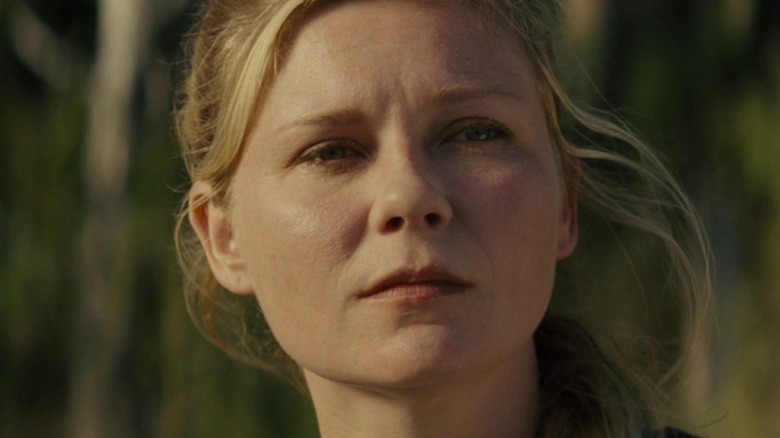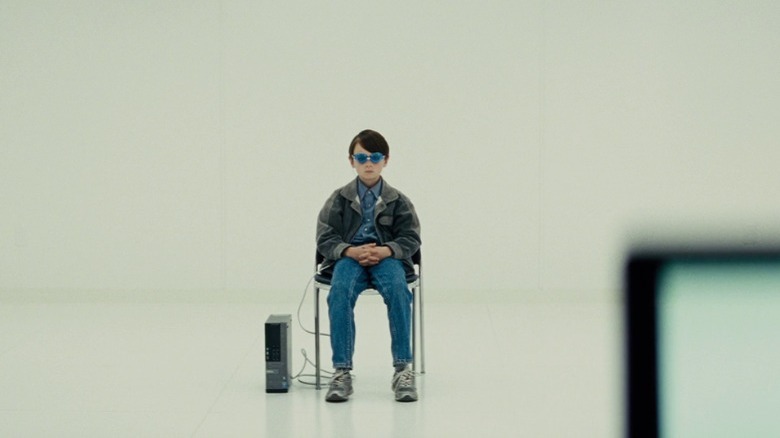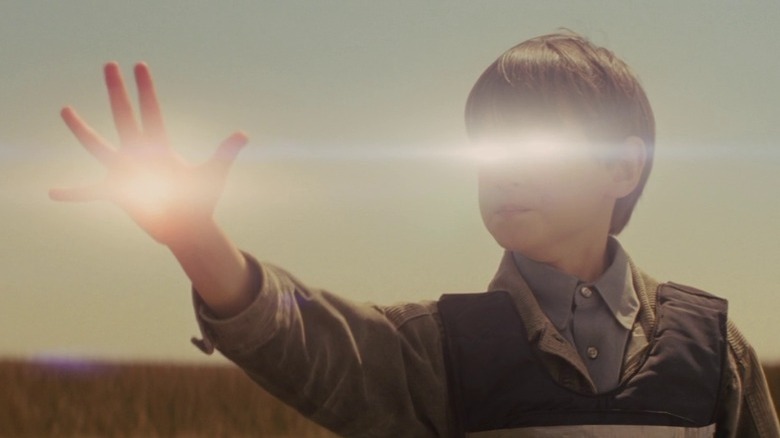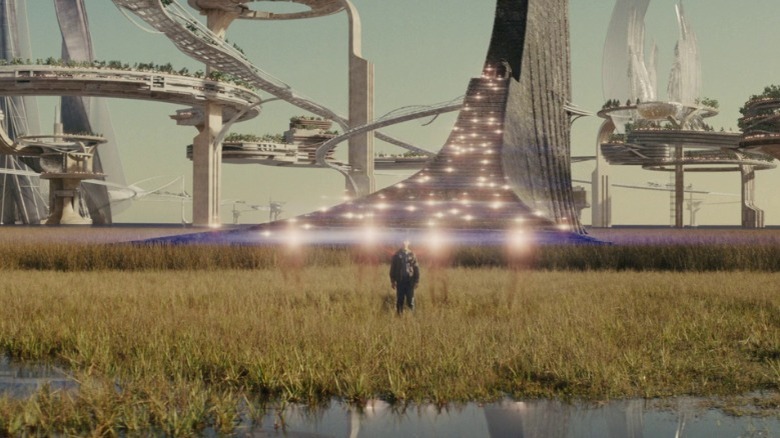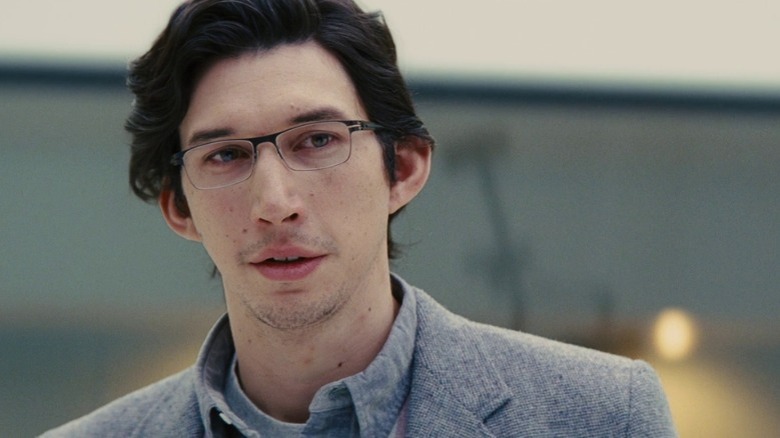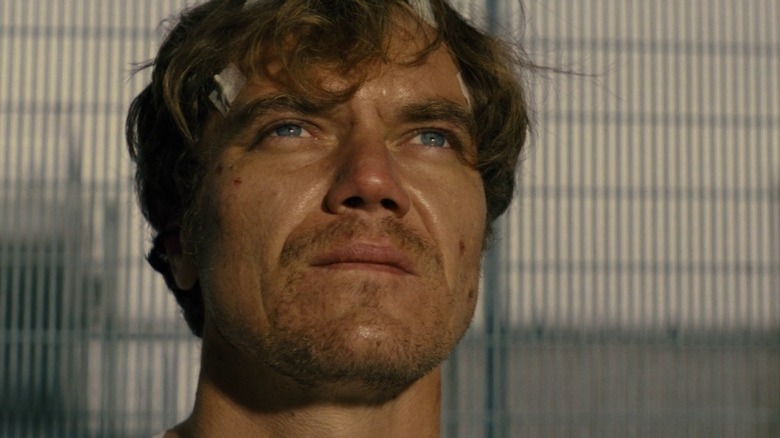The Ending Of Midnight Special Explained
We haven't gotten a new Jeff Nichols movie in a while, which is a shame, because the Arkansas-born American writer-director is easily one of the most exciting filmmaking voices of his generation. As a case in point, you can look to "Midnight Special," Nichols' 2016 sci-fi drama about a superpowered boy and the parents grappling with his abilities and doing their best to keep him safe.
Unlike most entries into the increasingly cluttered and omnipresent "superhero film" genre, "Midnight Special" is a film that dutifully, almost provocatively de-emphasizes the opportunities for popcorn-movie brouhaha offered by its premise. Instead of focusing on action sequences and CGI set pieces — though there are plenty of those too — or straightforward good-vs-evil showdowns, the film takes the shape of a muted, contemplative, character-based dramatic thriller, with very little in the way of exposition and a general proclivity for ambiguity and mystery in its world-building. This more complex and typically Nicholsian approach comes to a head in the film's ending, where the characters finally arrive at the destination they've been seeking out for the entire runtime — both on a literal physical level, and in a metaphorical sense, as the heady existential journey they've been on reaches its inevitable apex.
Yet the answers actually offered by that finale are a bit harder to parse, not least because the film plays coy about itself until its very last seconds. So what was up with the ending of "Midnight Special?" Keep reading on for an in-depth exploration.
Midnight Special is a film that deliberately withholds explanations
The plot of "Midnight Special" follows Roy Tomlin (Michael Shannon), his friend Lucas (Joel Edgerton), and his ex-wife Sarah Tomlin (Kirsten Dunst) as they struggle to protect Roy and Sarah's supernaturally gifted son Alton (Jaeden Martell, of "It" fame) and guide him to where he needs to be to fulfill his destiny, all while being pursued by both U.S. government authorities and members of the powerful cult from which Roy and Alton ran away.
The movie keeps explanations about Alton, the particulars of his powers, and their origin to a minimum, as the characters don't actually know that much themselves. This is very much intentional on Jeff Nichols' part: His aim throughout "Midnight Special" is to rope us into a situation where the limits of human understanding are defied by the enormity of the events at hand. The emotional crux of the movie is the dedication of Alton's guardians to protecting him even if they may not know just what is up with him or where it is they're taking him to — this no-questions-asked commitment, and the love it evinces, are what makes the film so moving, in its own taut, unfussy way. We move through chase sequences, run-ins with the military, and narrow escapes, and, all the while, what matters is Roy and Sarah's resolve to keep going for the sake of their son.
Eventually, the movie's action does lead to a climax — and it's perfectly in line with that unique approach.
The characters accept the unknown at the end
At the end of the film, just as the military has been able to apprehend Alton and it momentarily looks like all hope is lost, the boy is able to do to NSA agent Paul Sevier (Adam Driver) just what he's been able to do to all other adults over the course of the movie: By locking eyes with Sevier and showing him his light, he gets him to see, and to understand, immediately flipping him to their side.
The movie then pushes on through its exhilarating climax, in which Sevier successfully reunites Alton with his parents, and they all scramble to get Alton to a swamp in Florida, where he finally gets to make contact. Mere seconds after we get a glimpse of the beings who have been calling to him all movie long, and the awe-inspiring futuristic parallel world they inhabit, they — and Alton — vanish again into thin air.
Who are the beings? Why were they calling to Alton? Emotionally, the movie works just as fine if not better by not answering those questions clearly. It's enough, for us watching, to know that he belonged with them. The real point of interest is Roy and Sarah's process of acceptance of that fact — and, by extension, of the unknown, and the influence it exerts over their lives. But of course, much like the characters, we can still look back and try to get a handle on it all.
The parallel world represents a new horizon for human consciousness
When, in the film's most gorgeous and indelible scene, Alton parts ways with his mother and has his long-awaited encounter with the magical beings, a dome of light engulfs a large part of the United States' territory, and all those within its radius are suddenly allowed to see the mind-boggling structures of a world that has seemingly existed all along, just beyond our reach.
The beings who greet Alton are, themselves, made up of the same magical light that courses through him, leaving the question open of whether they are humans themselves who went through some sort of evolution process that Alton just got started on, or an altogether different species that somehow found one of theirs amongst us. The movie doesn't answer that question decisively — it doesn't even specify if that parallel world literally coexists with ours, invisible to us, or if what the beings opened was just some sort of temporary portal.
But, regardless of the answers to those questions, one thing is for sure: They are entities of higher knowledge and wisdom. The film codes them heavily as such by visually imagining their world as a hi-tech future beyond our wildest human dreams, and shows the humans' moment of contact with them as a great, universal dawning of clarity. It's safe to say that the event leaves everyone it touches fundamentally changed. All of which points back to the grand spiritual themes investigated by the film.
Midnight Special is a film about belief
Ultimately, the big question posed by "Midnight Special" is this: What is the nature of belief? The characters in it all know and understand, just going off Alton's existence outside all parameters of conventional scientific knowledge, that there's more to their world than they can really grasp. As mentioned before, they don't know and we don't know the how and why of Alton's powers, because this is specifically a movie about not knowing. But the thing about not knowing is that it doesn't preclude believing — and belief is a driving force in this film.
We, the audience, never see what it is that Alton shows Lucas and Sevier in order to get them to believe. What matters is that they do. We don't really get to know how Alton could have turned out to be a part of the entities' world if he is the son of two humans — what matters is that Roy and Sarah believe he belongs to that new world. The government scientists and cult members, each in their own way, try their best to rationalize and systematize the available knowledge on Alton — but everyone is immediately hushed by the dome of light, and the attending realization that what's happening is much too enormous to be accounted for. Suddenly, belief, as a mightier and more forceful human phenom than pure rational comprehension, takes precedence. They don't understand. They don't have to.
This theme is most clearly refracted through the character of Roy — whose journey in the film can rattle the audience's own belief system.
The film ultimately asks us what we, ourselves, believe about Roy
Roy Tomlin is, in many ways, an exemplary father, one who understands his son on a deeper level than anyone else in the world. And the clearest indicator of how much he gets Alton is the unending faith he has in the boy, never putting the responsibility of tending to the concerns and anxieties he must be harboring as a father on Alton's shoulders. If Alton says it, so it is.
The question is, how exactly does Roy understand so clearly that Alton needs that space? How is he so instinctively capable of sympathizing with such an (almost literally) alien experience? The final shot of "Midnight Special" offers two possible answers: Watching the sunrise from his new home in prison, Roy's eyes briefly glimmer with a light that calls to mind Alton's own powers.
Does this mean that Roy belongs to the same kind as Alton? Did he give up on his powers to stay on Earth? Could that be why he gets Alton's needs so intuitively? Or is that glimmer just plain old sunlight? Is it merely a callback to the earlier moment of Alton watching the sunrise for the first time, and feeling an immense sense of joy and realization?
Each viewer's answer will depend on what they themselves are inclined to believe about belief — whether it's a product of the certainty of experience, or the outreach of love. There's no answer, only possibility to ponder.
